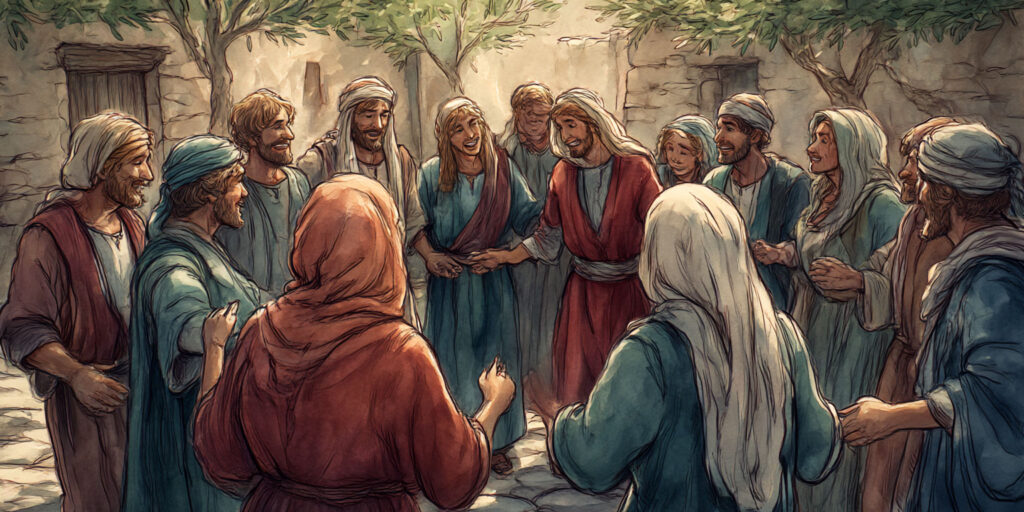
Peace
The gospel claims something bold: God offers real peace. Peace with Him, peace inside yourself, and peace with other people. But that peace isn’t automatic…

Paul, an apostle of Christ Jesus by the will of God, and Timothy our brother, To the saints and faithful brothers in Christ at Colossae: Grace to you and peace from God our Father.
We always thank God, the Father of our Lord Jesus Christ, when we pray for you, since we heard of your faith in Christ Jesus and of the love that you have for all the saints, because of the hope laid up for you in heaven. Of this you have heard before in the word of the truth, the gospel, which has come to you, as indeed in the whole world it is bearing fruit and increasing—as it also does among you, since the day you heard it and understood the grace of God in truth, just as you learned it from Epaphras our beloved fellow servant. He is a faithful minister of Christ on your behalf and has made known to us your love in the Spirit.Luke 1:26-35
Gratitude reveals who we are. What makes us laugh, what fills us with joy, and what we give thanks for says a lot about our character and priorities. That’s part of what makes Paul’s introduction to his letter to the Colossians so powerful. From a Roman prison cell, the apostle Paul writes not with bitterness, but with thankfulness—thankfulness for a group of believers he may have never even met.
Paul’s letters often begin in a similar way: he introduces himself, greets the recipients, and expresses his thanks to God for them. But don’t mistake the repetition for routine. These words aren’t empty flattery—they reflect Paul’s deep joy at seeing the gospel take root in people’s lives.
Writing to Colossae, Paul is thrilled simply because there is a church there. Despite persecution, despite imperfections, despite not being present in person, Paul rejoices that God is working in their lives. That joy is genuine. And it’s all the more remarkable when you consider his circumstances—he was imprisoned at the time.
Would we write with such joy from prison?
Paul’s gratitude wasn’t dependent on how “good” a church was. He could write to the Corinthians—a church full of problems—and still begin with thankfulness. He could write to the Thessalonians—young and eager but confused about Jesus’ return—and still express joy. He could praise the church in Ephesus for its maturity and growth. Why? Because Paul wasn’t thankful for perfection; he was thankful for God’s presence among His people.
Whether a church was strong or struggling, Paul saw potential. He saw what God could do with willing hearts, even if those hearts were flawed and learning.
Paul’s thankfulness centered on three things: faith, love, and hope. He rejoiced in the Colossians’ faith in Christ, their love for one another, and their hope laid up in heaven. These three characteristics formed the foundation of a Christian community. For Paul, hearing that those seeds were growing was enough to fill his heart with joy.
And that’s a challenge for us. What makes us ecstatic? What fills us with joy? Is it faith, love, and hope in others? Or is it comfort, success, and entertainment?
Paul’s joy wasn’t rooted in ideal conditions. It was rooted in God’s unchanging grace. That’s why he could rejoice in a church he didn’t plant, from a prison he didn’t deserve.
There’s a story about a man who walked past a pretzel vendor every day and left fifty cents without taking a pretzel. After five years, the vendor finally spoke up: “Sir, I appreciate your business, but you need to know—the price of pretzels has gone up to seventy-five cents.”
Sometimes we treat God the same way. He blesses us continually, and yet we silently raise the price. “God, I need more. I deserve more.” Gratitude fades, entitlement creeps in, and joy slips away.
Paul reminds us that everything is grace. Our life, our faith, our salvation—it’s all a gift. And when we remember that, gratitude returns.
In Hebrew, the word for gratitude is the same word used for confession. To be thankful is to confess our dependence on God. That’s why gratitude can be so difficult—it humbles us. It reminds us that we’re not in control, that our blessings are not self-earned.
A thankful life is a joyful life. Paul knew that. And he knew that the quickest way to lose gratitude was through complaining, anger, impatience, greed, or envy. He warns us not to focus on what’s missing, but on the One who never leaves us.
Paul’s thankfulness wasn’t vague or abstract. He listed what he was thankful for:
That the Colossians had faith in Christ.
That their love for one another was growing.
That their hope in heaven was secure.
That the gospel was bearing fruit among them.
That they were participating in God’s mission.
That God’s will was unfolding in their lives.
He even found joy in prison because the gospel was spreading there too.
So… what makes you laugh? What fills you with joy? What are you truly thankful for?
If the Kingdom of God is at the top of that list, you’ll find joy that outlasts every circumstance. Because God is still working, and even in the messiest places, His grace is still enough.

The gospel claims something bold: God offers real peace. Peace with Him, peace inside yourself, and peace with other people. But that peace isn’t automatic…

Advent starts by asking us to slow down and look past the distractions. Every culture wraps Christmas in its own extras—traditions, shopping, decorations, sentimental ideas.

After Paul left Galatia, other teachers came. They questioned Paul’s authority and offered the Galatians a far more “comfortable” message…

Jesus leaves the synagogue in Capernaum and steps into a home. Simon Peter’s mother-in-law lies with a high fever.

Paul writes to a church he has never visited, yet he sounds like a pastor who knows them well: he encourages, challenges, and points every road back to Christ…